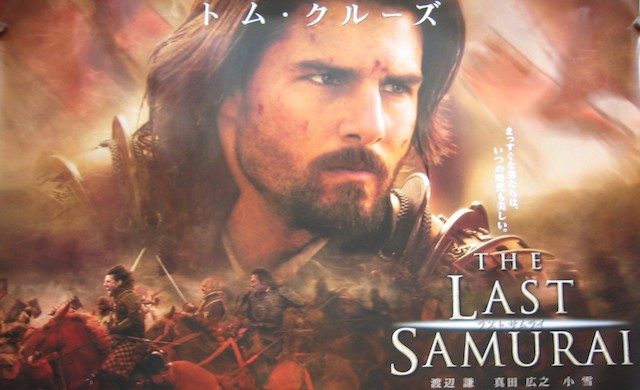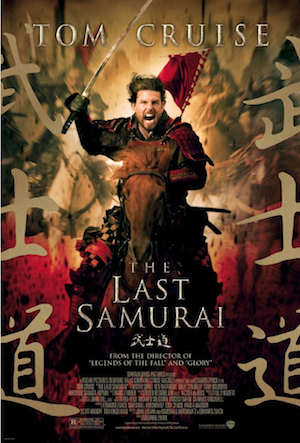
As we’ve seen in the conversations regarding “The Help” in recent weeks, making a film that’s about non-white people but has a white actor in the leading role is fraught with peril. On the one hand — or so the theory goes — it’s easier to get white audiences into theaters if there’s a central white character through whose eyes the story is told. On the other hand, that’s insulting to the people whose story it actually is. Back on the first hand, though, studios don’t like to make movies that don’t appeal to a wide audience. Studios like to make money.
Basically, I don’t know why anyone would ever make a movie that dealt with these issues, because you’re going to get hassled no matter what you do. This is why people tend to make movies about giant fighting robots instead.

“The Last Samurai” left itself wide open to criticisms about its handling of a distinctly Japanese story. It’s clear from watching the film that the title refers to a Japanese character played by Ken Watanabe — but the poster said “Tom Cruise” and “The Last Samurai” and had a big ol’ picture of Tom Cruise in the middle. You could easily get the impression that this story about the ancient Japanese system of honorable warriors was going to be about Tom Cruise. Moreover, it was directed by Ed Zwick, who had a reputation for this sort of thing: his 1989 film Glory, about a Civil War Army regiment made up of black men, had been criticized for focusing too much on their white commanding officer.
I don’t remember whether I had any of that in mind when I saw the film in December 2003. My review doesn’t make any reference to it. Plenty of other reviews did, though. Some quotes, courtesy of Rotten Tomatoes: “A white guy’s politically correct lesson abroad” (Desson Thomson, Washington Post); “Yet another in a seemingly endless line of Hollywood extravaganzas about clashing cultures … filtering its drama through a star stand-in” (Carol Cling, Las Vegas Review-Journal); “The kind of obsequious, star-f***** glory-hole Cruise has been savvy enough to avoid for the past decade” (Sean Burns, Philadelphia Weekly); “The only ‘samurai’ that counts is the Hollywood top blade named Cruise” (Thomas Delapa, Boulder Weekly); “A pandering epic that’s as phony as it is condescending” (Lou Lumenick, New York Post); “Built on a foundation no firmer than Cruise’s superstar persona” (David Sterritt, Christian Science Monitor; “Another Hollywood epic that shows that nobody embodies the nobility of an exotic foreign culture like a visiting white guy” (John Beifuss, Memphis Commercial Appeal); “A vanity project that is more than a little bit silly when you think about it” (James Verniere, Boston Herald); “It’s wannabe-ism on a multimillion-dollar scale, with an icon of Japanese culture somehow crudely penetrated by an interloper and turned inside out” (Stephen Hunter, Washington Post).
Cruise casts a big shadow, obviously. And this was before he jumped on Oprah’s couch!
Nonetheless, 65% of the reviews were positive, and the film earned four Oscar nominations, including one for Ken Watanabe and none for Cruise. It made $111 million in the U.S. and another $345 million overseas — including $119 million in Japan, where it was the second highest-grossing film of 2003. Japanese critics generally responded favorably to it. You might ask, if the movie’s portrayal of Japanese culture and history didn’t bother the Japanese, why should it bother anyone else?
But the more important issue to most people is this: regardless of ideology, is it a good movie? I sure thought so!
What I said then:
“Tom Cruise barrels through ‘The Last Samurai’ with a level of physicality he hasn’t displayed on film in some time…. He is ferocious, unleashed and electrifyingly physical. Motion is no longer just motion; it’s an expression of emotion. Which is why some action films are more than just action films, and why this one in particular transcends the genre…. It’s an epic, to be sure, but it keeps a close eye on the humanity of its story and eschews needless spectacle…. A minor misstep here and there is easily overlooked in such a grand, penetrating film. The war scenes are at once thrilling and horrifying, while the major characters fighting in them … come passionately to life. It’s a film about honor, and it’s an honorable film.” Grade: A- [complete review]
The re-viewing:
Being much whiter and more liberal than I was eight years ago, I wondered if my second viewing would make me cringe at the stuff that bothered those other reviewers in 2003. The opening narration by Timothy Spall didn’t bode well:
“They say Japan was made by a sword. They say the old gods dipped a coral blade into the ocean, and when they pulled it out four perfect drops fell back into the sea, and those drops became the islands of Japan. I say Japan was made by a handful of brave men, warriors willing to give their lives for what seems to have become a forgotten word: honor.”
Layin’ it on a little thick there, aren’t we? Good heavens.
But I didn’t find Tom Cruise’s Tom Cruise-iness distracting, nor did the movie strike me as a vanity project for a global superstar. Yes, his character starts out at a low (but still photogenic) point, gradually learning important lessons about honor and respect before redeeming himself and finding peace, and it’s all presented in a safe, conventional, Hollywood sort of way. But the same goes for plenty of historical epics that don’t star iconic celebrities, and people don’t call them “vanity projects” or “ego trips.” Nothing about Cruise’s performance in this film is particularly self-serving, or at least no more so than any heroic lead performance in any big-budget film is going to be.
The other charge leveled at the film isn’t Cruise’s fault: Why is his character, an American Army officer, the central focus in a story about the end of Japan’s samurai era and difficult transition into modernity? That’s a fair question. The obvious answer goes back to what we talked about at the beginning. By and large, white American audiences simply don’t go to movies that are entirely about non-white cultures or problems unless there’s somebody famous and/or American and/or caucasian in it. To be exclusively a Japanese story and still succeed financially, The Last Samurai would have needed a Japanese actor in the same league as Tom Cruise in terms of box-office draw. That may not be fair, but it’s the reality of the American movie business. So you can either make a film that tells your story but is somewhat Americanized, or you can make a film that is true to your ideas but runs a serious risk of not being seen by many people, or you can not make the film at all.
In the case of “The Last Samurai,” though, while Watanabe’s character is not the protagonist, he is the movie’s soul. Very little of the praise I heaped on Cruise the first time around rang true this time. He seems engaged but not especially powerful, ferociously intense but shallow. Katsumoto the samurai, on the other hand — there’s a character with depth, personality, and humor. I think it comes through clearly enough that he, not Cruise, is the important one.
And guess what? It turns out none of this is very important after all, because “The Last Samurai” is overlong and only fitfully engaging. The massive battle near the end, sure. Most of the interaction between Cruise and Watanabe, yes. Timothy Spall’s fussy British guy, okay. But there are also lengthy stretches that do little to advance the story or develop the characters. It’s an epic-length film, but it doesn’t have an epic story — and that’s ultimately what matters most.
Do I still love this movie?
I do not. The issues that I thought might nag at me the second time turned out not to be factors at all; instead, the movie felt bloated and stuffy — more “honorable” than, you know, “entertaining.” It is beautifully photographed, though, and Watanabe’s supporting performance is worth watching. Grade: B-
— Film.com




